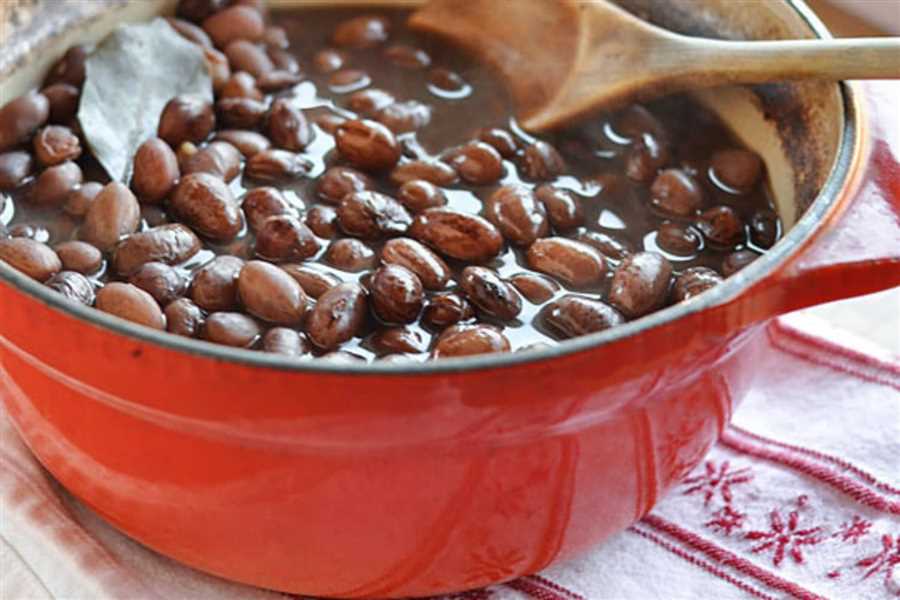Leaving cooked beans out overnight is not recommended due to the risk of bacterial contamination. Cooked beans fall into the category of perishable foods, which means they are more susceptible to spoilage and the growth of harmful bacteria.
When cooked beans are left at room temperature for more than two hours, the temperature becomes ideal for bacterial growth. Bacteria such as Salmonella and E. coli can multiply rapidly in this environment and cause foodborne illnesses.
To prevent the growth of bacteria, it is important to store cooked beans properly. They should be refrigerated within two hours of cooking. If you are unable to refrigerate the beans within this time frame, it is recommended to discard them to avoid any potential health risks.
So, to ensure food safety, it is best to refrigerate cooked beans promptly and consume them within a few days. It is always better to be safe than sorry.
Can You Leave Cooked Beans Out Overnight?
Many people wonder if it is safe to leave cooked beans out overnight. While it’s understandable that you might want to save time and effort by leaving beans out instead of refrigerating them, it’s important to consider food safety guidelines.
Understanding Food Safety Guidelines

According to food safety guidelines, perishable foods like cooked beans should not be left at room temperature for more than 2 hours. This is because bacteria can multiply rapidly in the danger zone between 40°F (4°C) and 140°F (60°C), which can lead to foodborne illnesses.
If you accidentally left cooked beans out overnight, it’s best to err on the side of caution and throw them away. While reheating the beans may kill some bacteria, it may not eliminate all of them and their toxins.
Properly Storing Cooked Beans
To ensure the safety and quality of cooked beans, it’s important to store them properly. Here are some tips:
| Step | Instruction |
| 1 | Cool the beans quickly by placing the pot in an ice bath or dividing them into shallow containers. |
| 2 | Label the containers with the date and store them in the refrigerator within 2 hours of cooking. |
| 3 | Use cooked beans within 3-4 days or freeze them for longer storage. |
Following these guidelines will help maintain the quality and safety of cooked beans and reduce the risk of foodborne illnesses.
Is It Safe?
Leaving cooked beans out overnight can pose a potential health risk. Bacteria can grow rapidly at room temperature, especially on foods that are high in moisture like cooked beans. The danger zone for food is between 40°F (4°C) and 140°F (60°C), as bacteria multiply quickly within this temperature range.
Leaving cooked beans out overnight allows them to sit within the danger zone for an extended period, increasing the risk of bacterial growth. Consuming these beans can potentially lead to food poisoning.
It is important to follow proper food safety guidelines to prevent the growth of harmful bacteria. Cooked beans should not be left out at room temperature for more than two hours. If the temperature is above 90°F (32°F), the time limit is reduced to one hour. After these time limits, cooked beans should be refrigerated or discarded.
Refrigeration slows down bacterial growth significantly, keeping the beans safe to eat for a longer period. When refrigerating cooked beans, it is important to transfer them to shallow, airtight containers to allow for rapid cooling. This helps prevent the growth of bacteria and preserves the quality of the beans.
In conclusion, it is not safe to leave cooked beans out overnight. It is best to refrigerate them within two hours of cooking to prevent bacterial growth and maintain food safety.
Bacterial Growth
Bacterial growth refers to the increase in the number of bacteria in a particular environment. Bacteria are tiny microorganisms that can multiply rapidly and cause foodborne illnesses if not handled properly.
Bacteria require certain conditions to grow, including a suitable temperature, moisture, and nutrients. The temperature danger zone for bacterial growth is between 40°F (4°C) and 140°F (60°C). This means that bacteria can multiply quickly in perishable foods left at room temperature.
Leaving cooked beans out overnight can provide an ideal environment for bacterial growth. Bacteria can start to multiply and reach harmful levels within a few hours, especially if the temperature is warm. These bacteria can produce toxins that can cause food poisoning when consumed.
It is important to handle cooked beans with care and follow proper food safety guidelines. Cooked beans should be stored in the refrigerator within two hours of cooking or reheating. If left out for more than two hours, they should be discarded to prevent the risk of foodborne illness.
To minimize the risk of bacterial growth, cooked beans should be cooled quickly before refrigeration. This can be done by placing the beans in shallow containers and placing them in the refrigerator or using an ice bath. Additionally, they should be stored in airtight containers to prevent contamination from other foods.
By understanding the principles of bacterial growth and practicing proper food safety measures, you can help prevent foodborne illnesses and ensure the safety of the food you consume.
Foodborne Illnesses
Foodborne illnesses, also known as food poisoning, are caused by consuming contaminated food or drink. These illnesses can be caused by bacteria, viruses, parasites, toxins, or chemicals present in the food or drink.
Common symptoms of foodborne illnesses include nausea, vomiting, diarrhea, abdominal pain, fever, and headache. In severe cases, foodborne illnesses can lead to dehydration, organ failure, and even death. The severity and duration of symptoms can vary depending on the type and amount of contaminant ingested, as well as individual factors such as age, health, and immune system function.
Preventing foodborne illnesses is essential for maintaining public health. This can be achieved through proper food handling, storage, and preparation. It is important to wash hands thoroughly before handling food, cook food to the appropriate temperature to kill bacteria, refrigerate perishable foods promptly, and avoid cross-contamination by keeping raw and cooked foods separate.
If you suspect that you have a foodborne illness, it is important to seek medical attention. Your healthcare provider can determine the cause of your symptoms and provide appropriate treatment.
Remember, it is always better to be safe than sorry when it comes to food safety. By practicing good hygiene and following proper food handling techniques, you can reduce your risk of foodborne illnesses and keep yourself and others healthy.
Proper Storage
Properly storing cooked beans is essential to maintain their freshness and ensure they remain safe to eat. Here are some guidelines to follow:
- Refrigeration: Cooked beans should be stored in an airtight container and placed in the refrigerator within two hours of cooking. This helps to prevent bacterial growth and keep the beans fresh.
- Temperature: The ideal temperature for storing cooked beans is below 40°F (4°C). Be sure to check the temperature of your refrigerator to ensure it is set correctly.
- Use within 3-4 days: Cooked beans should be consumed within 3-4 days of cooking. After this time, they may start to spoil and should be discarded.
- Freezing: If you are unable to consume the cooked beans within the recommended time frame, they can be stored in the freezer. Place them in an airtight container or freezer-safe bag and label with the date. Cooked beans can be frozen for up to 6 months.
- Thawing: When you’re ready to use frozen cooked beans, thaw them in the refrigerator overnight or use the defrost function on your microwave. Avoid thawing them at room temperature, as this can promote bacterial growth.
- Inspect before consuming: Before consuming cooked beans, always inspect them for any signs of spoilage, such as an off smell, mold, or unusual texture. If you notice any of these signs, it’s best to discard the beans.
By following these guidelines, you can safely store and enjoy your cooked beans for an extended period.
Temperature Danger Zone

The temperature danger zone refers to the range of temperatures in which bacteria can grow and multiply rapidly on food, posing a risk to human health. This zone is defined as between 40°F (4°C) and 140°F (60°C).
When food is left within this temperature range for extended periods of time, bacteria can multiply to dangerous levels, increasing the risk of foodborne illnesses.
It is important to note that the temperature danger zone is not limited to room temperature. It includes any temperature between refrigeration (below 40°F or 4°C) and cooking (above 140°F or 60°C).
| Temperature Range | Microbial Growth | Food Safety Recommendations |
|---|---|---|
| Below 40°F (4°C) | Minimal | Refrigerate perishable foods to prevent spoilage and maintain freshness. |
| 40°F – 140°F (4°C – 60°C) | Rapid | Avoid leaving food in the temperature danger zone for more than 2 hours (or 1 hour if the temperature is above 90°F or 32°C). |
| Above 140°F (60°C) | Minimal | Cook foods thoroughly to kill bacteria and prevent foodborne illnesses. |
Along with proper food storage and cooking practices, it is also important to ensure that dishes and utensils are cleaned and sanitized properly to prevent cross-contamination.
By understanding and following food safety guidelines, you can reduce the risk of foodborne illnesses and ensure that the food you consume is safe to eat.
Questions and answers
Can you leave cooked beans out overnight?
It is not recommended to leave cooked beans out overnight as it can lead to bacterial growth and food poisoning. It is best to refrigerate cooked beans within 2 hours of cooking to maintain their freshness and safety.
What happens if you leave cooked beans out overnight?
If cooked beans are left out overnight, they can become a breeding ground for bacteria. Bacteria can multiply rapidly in a warm environment, and consuming spoiled beans can cause food poisoning and gastrointestinal discomfort.
How long can cooked beans sit out?
Cooked beans should not sit out for more than 2 hours at room temperature. After that, it is recommended to refrigerate them to prevent bacterial growth and maintain their quality and safety.
Can you eat beans that have been left out overnight?
It is not advisable to eat beans that have been left out overnight as they can harbor harmful bacteria. Consuming these beans can lead to food poisoning and other health issues. It is better to discard them to ensure your safety.
What is the proper way to store cooked beans?
The proper way to store cooked beans is to let them cool to room temperature and then refrigerate them within 2 hours of cooking. Place them in an airtight container or a sealed plastic bag to maintain their freshness and prevent bacterial growth.







